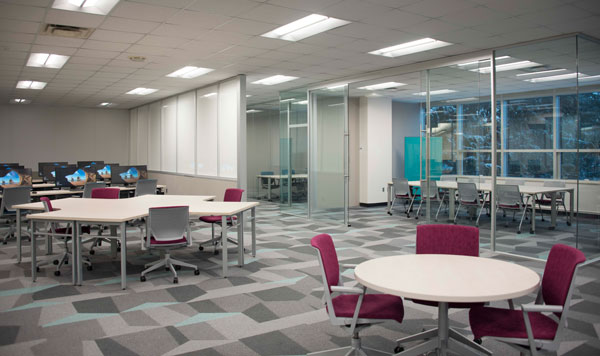
A state-of-the-art Digital Scholarship Lab (DSL) that includes a 360-degree immersive visualization room, the first of its kind at any university in the United States, will officially open at Michigan State University’s Main Library on Monday, February 5, with several opening week events planned for February 5-9.
MSU Libraries and the College of Arts & Letters partnered to build the 10,000-square-foot Digital Scholarship Lab, which, besides the 360-degree immersive visualization room, will feature a virtual reality room with VR headsets, instruction space, meeting rooms, offices, and a dedicated room for digitization projects.
The 360-degree immersive visualization room, an Igloo Vision design, can accommodate up to 15 people at a time and will offer flexible applications for all disciplines in teaching, learning, and research. Michigan State University is the first university in the United States to have an Igloo Vision visualization cylinder, which is designed for multidisciplinary use and has a software platform that allows for easy display of a number of visual formats.

The virtual reality room will feature four VR headsets, two Oculus Rifts and two HTC Vives. There also will be workstations throughout the lab with high-speed computers and software to support sophisticated design and data analysis and to facilitate cross-disciplinary collaboration.
“Located at the heart campus, our students and faculty now have access to a state-of-the-art facility that elevates our widely recognized strengths in the digital arts and humanities,” said Christopher P. Long, Dean of MSU’s College of Arts & Letters. “This unique space affords students and faculty access to equipment and experiences unavailable anywhere else in higher education. This space represents the power of collaboration. It will be a destination for the best faculty and students at MSU and across the globe.”
The potential research and teaching applications of the lab are endless. In the immersive visualization room, history classes can use Google Street View to explore architecture from around the world in just a few clicks; art history classes can engage in the process of an archeological dig right from the lab in East Lansing; interior designers can make their designs come to life; and game developers can develop and display their video games in a fully immersive environment.
“Located at the heart campus, our students and faculty now have access to a state-of-the-art facility that elevates our widely recognized strengths in the digital arts and humanities.”
“Stepping inside one of these spaces is a little like stepping inside a giant VR headset,” said Peter Halliday, Head of Communications for Igloo Vision. “And, because entire teams can get inside, it’s always a shared experience, so it’s ideal for collaborative teamwork, research, projects, and training.”
Students and faculty across MSU will be able to use the advanced and graphics-intensive computing software and interactive visualization for research projects and scholarly exploration. The Digital Scholarship Lab also brings together collections, resources, tools, and expertise all in one place.
“The workstations, the digitization, and the virtual reality are all available to differing degrees at places across campus, but we’re bringing them into one space and making them more available through longer hours, a dedicated service point, and consultations,” said Terence O’Neill, Head of Digital Scholarship and Makerspace Services at MSU Libraries. “The Digital Scholarship Lab will be a place for specialized groups across campus to learn from one another and create a community around digital scholarship.”
Located on 2-West of MSU’s Main Library, the Digital Scholarship Lab initially will open Monday-Thursday from 9 a.m. to 7 p.m., Friday from 9 a.m. to 5 p.m., and Saturday and Sunday from noon to 5 p.m. To meet the educational and research needs of the MSU community, the library plans to expand the lab’s hours after spring break, which is scheduled for March 5-9.

Details on open consultation or making an appointment can be found on the Digital Scholarship Lab website.


